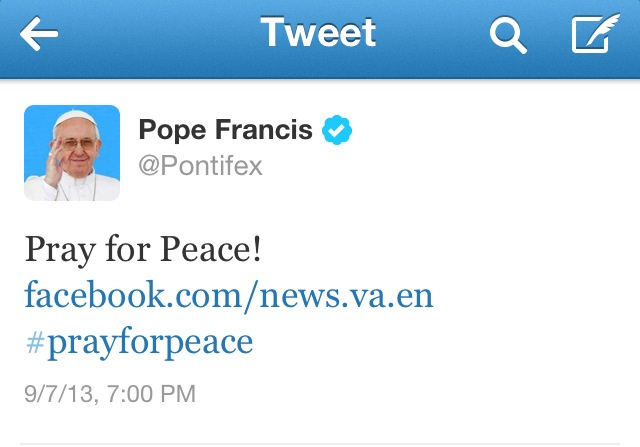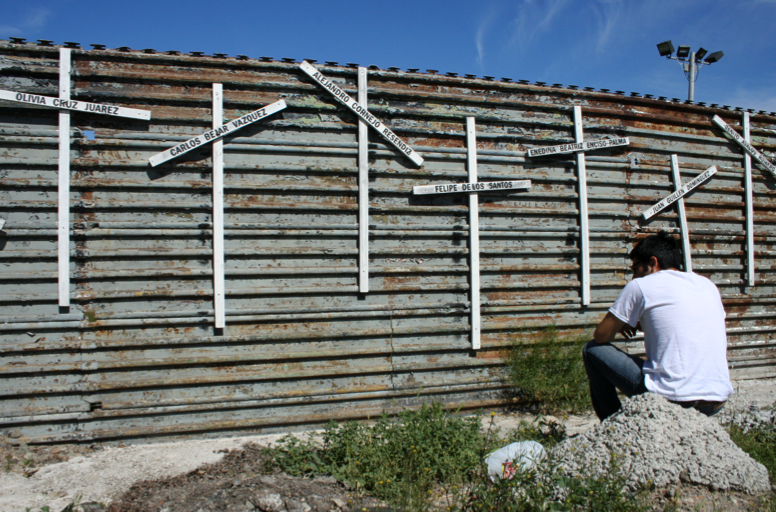Was Pope Francis’s prayer for peace in Syria in September 2013 a failure? Daniel Petri, writing recently at Millennial, asks this question, and answers it in the affirmative. Lamenting the continued violence and dislocation in Syria, Petri claims that the prayer for peace is perhaps “the biggest failure of the Pope Francis ‘revolution.’” Faulting both Pope Francis and the United States Conference of Catholic Bishops for their opposition, Petri instead calls on them to advocate for armed intervention to defend the human rights of the Syrian people. Robert Christian likewise had made much the same point in an earlier article on Time.com, writing that the day of prayer failed to bring peace to Syria, and adding:
By inserting himself into the conflict and failing to support a realistic plan to secure peace, the pope has failed in his responsibilities. His biggest failure has been his unwillingness to speak with moral clarity on the illegitimate nature of Assad’s regime and to side with the Syrian people against Assad’s continued rule.
I sympathize with Petri and Christian’s position, not only because the fate of the Syrian people in the midst of war is an injustice that cries to heaven, but also because in my own spiritual life I have at times wrestled with the sometimes seeming ineffectiveness of prayer. Why, despite the fervent prayers of friends and family, does someone suffering from illness ultimately succumb? What about those who suffer in anonymity, without the support of others’ prayers? Having experienced these struggles, I find it useful to consider what the Catechism of the Catholic Church teaches about prayer:
The revelation of prayer in the economy of salvation teaches us that faith rests on God’s action in history. Our filial trust is enkindled by his supreme act: the Passion and Resurrection of his Son. Christian prayer is cooperation with his providence, his plan of love for men [sic]. (#2738)
The faith expressed in prayer is trust in God’s wisdom, that even though we may ask about our specific needs and the needs of others, we do so not as a way to bend God’s will to our own, but rather as an expression of our utter dependence on His will: “not my will, but yours be done.” (Lk. 22:42) The Catechism likewise states, “In prayer, the faithful God’s initiative of love always comes first; our own first step is always a response” (#2567). Although in prayer we speak to God, authentic prayer must first be a listening to God, an openness to his transforming love.
Although these meditations seem most suited to personal prayer, they also shed light on public, communal prayer, such as the prayer for peace in Syria, as well. Here I think the biblical witness gives necessary insight into how a prayerful mindset is relevant for public decision-making, including decisions about war.
Despite the uses to which the Bible has been put by both pacifists and supporters of the just-war tradition, as John A. Wood notes in his Perspectives on War in the Bible:
There was, in fact, no one normative view about warfare [in the Bible]. Rather, there were several normative views competing in the marketplace of ideas. Underneath this remarkable diversity among the writers of the texts and among reflective people within the community, however, stood one unifying theme—trust in Yahweh. Whether one believed in non-violent conflict resolution, or in allowing God only to engage in war, or in joining with Yahweh in engaging in holy war, or in fighting in a justified war, all of these sought to operate out of an attitude of trust in the one true God. (pp. 5-6)
One of the most noteworthy examples of this trust in God on questions of war is the prophet Isaiah’s perspective on the Assyrian invasion of the southern kingdom of Judah in 701 BCE. The Assyrians had completed the conquest of the northern kingdom Israel around 720 BCE, leaving Judah under Assyrian domination. King Hezekiah of Judah rebelled against this domination, refusing to pay the tribute to Assyria that had been begun by his father Ahaz, and implementing religious reforms that themselves had political implications, cleansing Israel of the Assyrian gods. In planning his rebellion, Hezekiah placed his trust in an alliance with Egypt, expecting that the combined Egyptian and Judean forces would be able to repel the anticipated Assyrian invasion. It is here that Isaiah exhorts Hezekiah to trust in God rather than the Egyptians, both for reasons of political prudence (indeed it was an ill-fated alliance with Assyria against the invading forces of Syria and the northern kingdom of Israel that had led to Judah’s subjugation to Assyria under Ahaz) and due to the lingering memory of Israel’s earlier liberation from slavery and idolatry in Egypt. In the crucial passage, Isaiah warns:
Ah! Those who go down to Egypt for help,
who rely on horses;
Who put their trust in chariots because of their number,
and in horsemen because of their combined power,
But look not to the Holy One of Israel
nor seek the LORD!
Yet he too is wise and will bring disaster;
he will not turn from his threats.
He will rise up against the house of the wicked
and against those who help evildoers.
The Egyptians are human beings, not God,
their horses flesh, not spirit;
When the LORD stretches forth his hand,
the helper shall stumble, the one helped shall fall,
and both of them shall perish together. (Is. 31:1-3)
Isaiah calls on Judah to trust in God rather than weapons and the human beings who make them. Unfortunately, Isaiah’s words went unheeded, and the Egyptian forces failed to materialize, leading to Assyrian victories throughout Judah. Nevertheless, at least according to 2 Kings 19, God ultimately came to the defense of Judah, inflicting a plague on the Assyrian army as it besieged Jerusalem.
This same call to trust in God rather than weapons is found elsewhere in the Old Testament, as well:
Because you have trusted in your own power,
and in your many warriors,
The clamor of war shall break out among your people
and all your fortresses shall be ravaged . . . . (Hs. 10:13-14)
Some rely on chariots, others on horses,
but we on the name of the LORD our God.
They collapse and fall,
but we stand strong and firm. (Ps. 20:8-9)
For I was ashamed to ask the king [Ataxerxes of Babylon] for troops and horsemen to protect us against enemies along the way, since we had said to the king, “The favoring hand of our God is over all who seek him, but his fierce anger is against all who forsake him.” (Ez. 8:22)
As Wood makes clear, the point here is not that the Israelites can never take up arms, but rather that they should never let their trust in military might overshadow their trust in God. At other times the Israelites express their trust in God through taking up arms, in what Patrick Miller has called a “synergism” of divine and human action. A striking example is found in 1 Samuel when Jonathan, the son of King Saul, leads an Israelite force against the Philistines. Jonathan states:
“Come, let us go over to that outpost of the uncircumcised [i.e., the Philistines]. Perhaps the LORD will help us, because it is no more difficult for the LORD to grant victory by means of a few than it is by means of many.” (1 Sm. 14:6)
The Israelites fight, but God grants the victory. Wood also notes that the fact that Jonathan seeks a sign from God that the attack is God’s will (1 Sm. 14:8-10) shows that the Israelites “did not assume . . . that because ‘God was on Israel’s side’ they could assume carte blanche that every battle would result in victory.” (p. 39)
Returning to our own time, these reflections suggest that Pope Francis’s prayer for peace in Syria is best understood not as a bit of magic that could more effectively bring peace to Syria than guns and bombs, but rather as a call to put our trust in God, to listen for how God is calling us to help establish peace. Christian is right that Francis’s call for peace was intended to counter talk of a U.S. military intervention in Syria, but both Christian and Petri are wrong that the “failure” of prayer to bring peace to Syria therefore means that military intervention is now justified. Calls for intervention reflect a different kind of magical thinking, a belief in the redemptive power of violence similar to Hezekiah’s false trust in the might of the Egyptian chariots. Petri and Christian have allowed the righteousness of their cause to obscure the other criteria the just-war tradition asks us to consider. As I wrote a few days before the prayer for peace:
The call for military intervention in Syria arises from the desire to “do something” when faced with evil, yet it is not clear what intervention will accomplish. . . . Our faith in redemptive violence blinds us to those outcomes more likely than peace if we intervene.
If the intervention is to be neither an invasion nor an occupation, as Christian suggests, then how are we assured that it will actually bring peace, rather than further civilian casualties? Knowing that Bashar Assad is backed by Russia, how likely would it be for Russia to answer U.S. intervention with its own, widening the conflict? With commentators suggesting that the newly aggressive behavior of Russia and China in places as diverse as Ukraine, Syria, and the South China Sea risks a World War I-like scenario in which a regional miscalculation transforms into a global conflagration, caution is the order of the day. As both Petri and Christian admit, the conflict in Syria is closely tied to our struggle with ISIS in Iraq, but the latter struggle is dependent on cooperation with Iran, which would become impossible if we were to more forcefully deal with Syria, Iran’s close ally.
If there has been a failure, it has been a failure to respond creatively and nonviolently to Pope Francis’s peace prayer. How can Christians around the world effectively contribute to peace in Syria? Christian criticizes the Geneva II peace negotiations, supported by both Pope Francis and the USCCB, for failing to bring peace, but a significant factor in that failure has been the U.S.’s inability to convince the Syrian rebels to accept a settlement in which Assad remains with some degree of power; the complexity of the Syria-ISIS nexus suggests that a power-sharing agreement in which Assad’s power is maintained but limited might be the best bet for regional peace, and should be promoted. Christians must also think more creatively, and work with the Syrians themselves to think more creatively, about how we can work for peace nonviolently. American Christians can respond by learning more about, and finding ways to support, Syrians seeking peace through nonviolent methods, such as the Syrian Nonviolent Movement and Building the Syrian State. As my friend David Cochran has shown, nonviolent methods, far from being utopian, have over time been more effective in establishing lasting peace in situations of conflict than violence. Are we willing to trust that God can lead us in the path of peace?






It is a pagan understanding of divinity that judges the success of prayer by whether the praying people’s wishes have been granted. Gods are limited beings to be manipulated in to serving our will. The Christian understanding of divinity judges the success of prayer by whether the praying people’s hearts of have been changed. If God is all knowing, all powerful and all good then He is already doing the very best things for us. In prayer we bear our hearts, including our deepest hopes and fears, to God and if the prayer “works” we actually allow God to shape our hearts and minds into trust and cooperation with Him. Whether that leads to armed defense of humanity or non-violent solutions, we ask “Thy will be done.” By that standard, the changing of the hearts of those who pray, I think Pope Francis’ prayer worked.